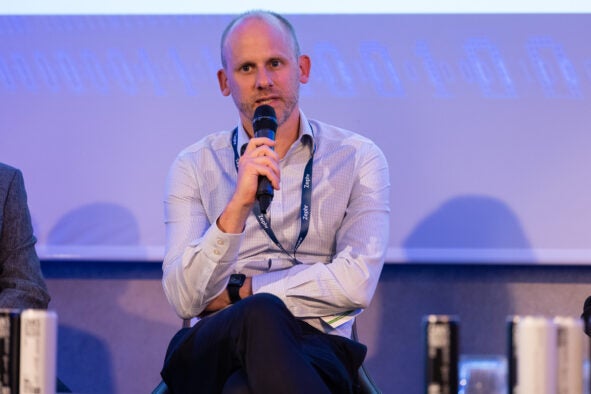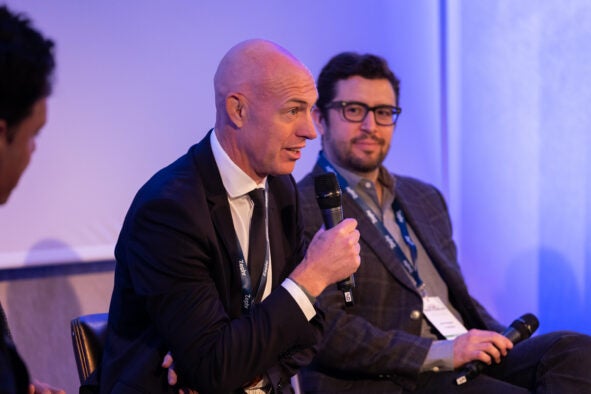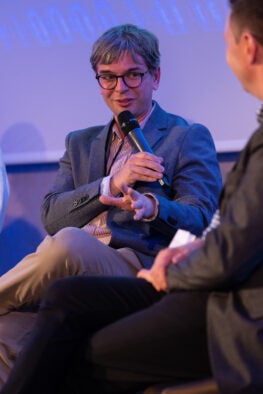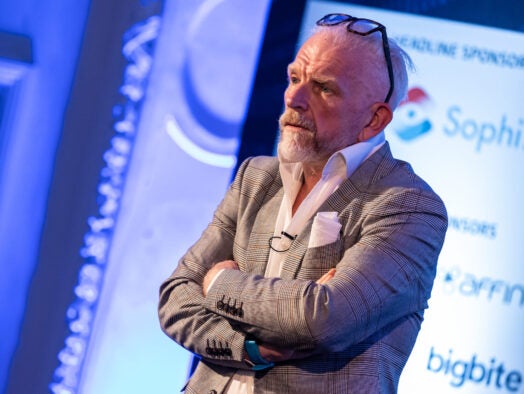Be patient when launching a news podcast. Don’t hoard data. Don’t fear the idea of having of robots in your newsroom. And have fun.
These are just some of the useful takeaways from Press Gazette’s inaugural Future of Media Technology Conference held at the Waldorf Hilton in London on 21 September.
The wise voices sharing their expertise included The Independent’s chief data and marketing officer Jo Holdaway, News UK chief operating officer David Dinsmore, Reach chief revenue officer Piers North, and Claudia Quinonez, managing editor for news automation at Bloomberg News.
Here the Press Gazette team has rounded up some of the key insights we think media leaders will find useful from the day.
Find more of our coverage from the Future of Media Technology Conference here.
And listen to us discuss some of these takeaways, with clips from the experts themselves, on the latest episode of our Future of Media Explained podcast here.
Face up to news avoidance
Nic Newman, lead author on the Reuters Institute Digital News Report, got the attention of the conference with a warning that 46% of Britons say they actively avoid the news at least some of the time. This was double the figure in the 2017 Reuters survey.
Meanwhile, the proportion of people who say they avoid news altogether on all platforms was 8% in 2022, up from 1% in 2013.
Newman said: “People say the news makes them depressed, has a negative effect on their mood, nearly half the avoiders say that. There’s too much politics, not enough diversity in the news agenda are more of the key reasons.”
One UK woman aged 22 told the Reuters survey: “I actively avoid news about politics. It makes me feel small and no matter what my views it won’t make any difference.”
A 27-year-old man from the UK said: “I avoid things that trigger my anxiety and things that can negatively impact on my day.”
Newman warned: “This raises some quite significant issues for the news industry.”
And quoting an article from Amanda Ripley at the Washington Post, he suggested a radical rethink of the news product may be needed.
Ripley suggested giving readers hope and inspiration alongside the necessary coverage of difficult stories, giving people more of a sense of what they can do to make a difference, and stressed the importance of empathy when telling stories.
Newman cited the success of slow journalism outfits like Tortoise and the growth in explainers and solutions journalism as possible solutions to this challenge for the news industry.
Get your data house in order
The big theme of the cookie apocalypse panel was: start getting first-party data and don’t let it, or the resulting advertising, harm your audience’s experience.
Jo Holdaway, chief data and marketing officer at The Independent, and Karen Eccles, managing director of digital, partnerships and innovation at The Telegraph, spoke about their efforts to get their data houses in order by encouraging registrations and thereby increasing their first-party data capture. Eccles in particular said having good data had really helped the value proposition of advertising on The Telegraph.
She also noted that having more ads wasn’t necessarily better, saying all The Telegraph’s maths showed more ads on-page resulted in lower yields.
And on the topic of less being more, Markus Karlsson, chief executive of media business platform Affino, told us the data you keep should be relevant.
His clients, he said, are often now actually in the position of deleting data from unengaged readers. Besides making your targeting less effective, Karlsson said keeping reams of irrelevant data can be hazardous in case illegal information – for example, about underage children – slips through your net and lands you with a major fine.

L-R: Peter Barr-Watson
CTO/director of digital, The Spectator (1828) Ltd, Markus Karlsson, CEO at Affino, Jo Holdaway, chief data and marketing officer at The Independent, and Karen Eccles, managing director of digital, partnerships and innovation at The Telegraph,
at the Future of Media Technology Conference. Picture: ASV Photography Ltd
But data is not the ‘only answer’
Piers North, chief revenue officer at Reach, warned that “you have to control the data” to survive in a digital advertising business – with a key compromise.
“You need to transact that data as best you can, but you also need the volume.”
But he went on to say that “data isn’t the only answer because if you go toe to toe in data you are a mere fly on the windscreen of the big platforms globally… whether you are a publisher in the UK, it doesn’t matter where you are in the world, there is no publisher that can take on the platforms toe to toe in data and so you have to have a mixed approach on the advertising side”.

Reach chief revenue officer Piers North at the Future of Media Technology Conference. Picture: ASV Photography Ltd
North added that “you absolutely need to try to own the customer and the data yourself and that’s your hygiene factor” but that it was necessary to work with big tech using offerings like Apple News and Facebook Instant Articles to reach people in the first place. “Getting them onto your platform to acquire their data has to be the goal but you need to seed your content out in the space.”
North added: “The tentacles run way deep… they are just part of the landscape and the key is to work with them constructively.”
Why micropayments are ‘not a panacea’
News UK chief operating officer David Dinsmore addressed why he remains unconvinced on the business case of micropayments – in other words, allowing people to pay small amounts of money for individual articles rather than buy a subscription.

David Dinsmore speaks at the Future of Media Technology Conference. Picture: ASV Photography Ltd
“While in principle it sounds like a great idea, in practice I don’t think it really works with the technology we have available at the moment to us and we are all about building brands, we should be all about building brands, and the editorial curation that goes in there and we should be able to sell a product,” Dinsmore said.
“So I never write anything off forever, but as we stand today it is not the panacea that people, I suspect who aren’t in the industry, think it is because it’s usually those that say that would be the route to success. But I do think there will be technologies in the future that will make it easier to pay for content in different ways.”
Podcasts for publishers: Cheap to make, but be profit patient
There was much excitement shared about the growth of the UK’s podcast sector at the Future of Media Technology conference. Digital audio bosses from the BBC, Financial Times and Evening Standard say we’re heading into a “golden age” for the sector.

Matt Hill of Rethink Audio at the Future of Media Technology Conference. Picture: ASV Photography Ltd
Matt Hill, the founder of podcast production firm Rethink Audio and co-founder of the British Podcast Awards, offered some useful tips for publishing businesses that want to launch new series.
His advice? Be patient. “Particularly for current affairs shows, you may have to get quite a lot under your belt to get a consistent product with an audience,” he said. “Because everyone starts with zero and you can’t monetise an audience of zero. So you have to work on that and build an audience for your show.”
Hill’s Rethink Audio produces The Week’s podcast, Unwrapped. He revealed that the podcast took nearly a year to start making money.
“We did about 40 episodes of that before we had a sponsor come on,” he said. “And that sponsor in, I think it was the first deal, basically paid for the previous year’s content. It is about building an audience, a certain amount of R&D, but then from that point forward, it not only covered its costs but it started to make money.”
Hill also pointed out that, for publishers, podcast production can be relatively cheap. “Journalists generally have all the information you need in their heads. You don’t need a producer to therefore do a lot of research and to do a lot of planning around an episode when you could easily train a journalist to write a podcast script, present the show or assimilate their knowledge into questions for a separate podcast interview. So you’ve already got that cost already built into what you’re doing.”
Journalists should not fear the rise of robots
The final session of the day was focused on data journalism, with the panel comprising experts from the BBC, Bloomberg News, CNN and United Robots.
Claudia Quinonez, managing editor for news automation at Bloomberg News, said she is often asked whether AI developments have led to journalism job cuts.
“The interesting thing is that it has not materialised,” she said. “So we’ve been doing this for eight years, and it’s just not what happens. You do not automate people out of their jobs. You actually automate tests that they hate doing in a very precise way.”
She added: “So really, at the end, we’re best if we look at technology as our friend. Because it can help us do incredible journalism. It can help us find incredible data trends which I think enables… the group of journalists [with] sound news judgement and a knowledge of which trends are really relevant. And we just help them do that faster and better.”
Asked if automation has eaten into journalism jobs at CNN, Deepna Devkar, vice president of data science and engineering at the US news giant, said: “It’s actually the exact opposite. We’re here to enable journalists to do what they do best…
“We’re not at all here to automate journalism. I think creativity will never be replaced by machines, and it can’t be. That’s what makes us us. And so, we have a very strong partnership with our editorial team.”

Deepna Devkar
Vice President of Data Science & Engineering, CNN, and Claudia Quinonez
Global Head, Bloomberg’s News Innovation Lab at the Future of Media Technology Conference. Picture: ASV Photography Ltd
…but it still helps to get journalists acclimatised to robots first
Bala Sundaramoorthy, the general manager at Cox Enterprises’ Atlanta Journal-Constitution newspaper, told Sophi executive Gabe Gonda that before the publication implemented Sophi’s AI software in full, they tried to get buy-in from the newsroom.
“We got a set of super-users trained first. And when we reached a point where we had enough ambassadors in the journalism side of the house, then we rolled it out to everybody,” Sundaramoorthy said.
Sophi is software originally developed by Canada’s Globe and Mail newspaper to present a reader with a paywall at the moment they’re most likely to pay, based on data about that reader and the content they’re reading. The data generated also feeds back into insights over what types of story generate subscriptions.
Sundaramoorthy said: “I believe a huge part of our success came from the newsroom buying into this concept that we’re not implementing technology that can come and take their jobs away, or that replaces what they’re doing. We made it very clear this is here to shine a spotlight on what you do.”

Gabe Gonda, VP of Sophi.io, and Bala Sundaramoorthy, VP and general manager for the Atlanta Journal-Constitution at the Future of Media Technology Conference. Picture: ASV Photography Ltd
Those data insights, Sundaramoorthy said, led the paper to go deeper in its coverage of subjects that might have gone overlooked.
“What we’ve seen play well for us is politics, sports and anything that you do that deeply covers the local community…
“It’s an interesting thing, on the qualitative research side, what people say they are willing to pay for and what they actually pay for. People will say ‘I’m willing to pay for these things’ and then they actually liked reading arts and culture and lifestyle stories…
“We’ve doubled down, tripled down on on education coverage. We had one of the best education teams, but we’ve gone even deeper because we’ve seen that education drive subscriptions much, much more than we ever would have thought it could. So it’s been a good feedback loop back to the newsroom.”
Accept what you can’t change
Ellis Watson, a former chief executive and chairman of DC Thomson as well as executive at several other media and entertainment companies, delivered a rousing keynote speech entitled: “Cheer the f**k up.”
Notably, given the cost of living crisis currently hitting the UK, he told people they “need to be stoic and accept what can’t change”.

Ellis Watson at the Future of Media Technology Conference on 21 September 2022. Picture: ASV Photography Ltd
Among Watson’s other words of wisdom were to ensure your teams find what they do “ludicrously fun” and avoid getting bogged down in the challenges of the industry which can make businesses feel “incredibly stagnant”.
He added: “In UK media right now there is this really weird schizophrenic state where everyone’s looking at what everyone else is doing… go and make a few waves yourself and be a little bit braver in your own business model.”
Picture: ASV Photography Ltd
Email pged@pressgazette.co.uk to point out mistakes, provide story tips or send in a letter for publication on our "Letters Page" blog
